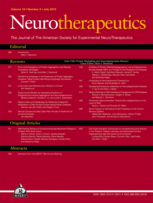Neurotherapeutics
Neurotherapeutics refers to the branch of medicine that deals with the development and application of therapies for neurological disorders. This field encompasses a wide range of approaches, including pharmacological, surgical, and rehabilitative strategies aimed at improving, restoring, or maintaining neurological function. Neurotherapeutics is a rapidly evolving area, driven by advances in neuroscience, genetics, and biotechnology, offering new hope for patients with conditions that were once considered untreatable.
Overview[edit | edit source]
Neurological disorders, such as Alzheimer's disease, Parkinson's disease, multiple sclerosis, epilepsy, and stroke, affect millions of people worldwide, posing significant health, social, and economic challenges. Neurotherapeutics seeks to address these challenges by developing effective treatments that can alleviate symptoms, halt or slow disease progression, or cure these conditions. The field is inherently interdisciplinary, integrating insights from neurology, psychiatry, molecular biology, pharmacology, and other disciplines.
Pharmacological Therapies[edit | edit source]
Pharmacological treatments are a cornerstone of neurotherapeutics. These include drugs that modulate neurotransmitter levels, such as antidepressants, antipsychotics, and medications for neuropathic pain. Recent advances have led to the development of more targeted therapies, such as monoclonal antibodies for multiple sclerosis and gene therapy for certain forms of genetic neurodegenerative diseases.
Surgical Interventions[edit | edit source]
Surgical approaches in neurotherapeutics include procedures such as deep brain stimulation (DBS) for Parkinson's disease and other movement disorders, neurosurgery for removing brain tumors, and vascular surgery for treating stroke. Minimally invasive techniques and improved imaging technologies have significantly increased the safety and efficacy of neurosurgical interventions.
Rehabilitative Therapies[edit | edit source]
Rehabilitation therapy plays a critical role in neurotherapeutics, especially for patients recovering from stroke or traumatic brain injury. These therapies aim to help individuals regain lost functions or compensate for functional deficits through physical therapy, occupational therapy, and speech-language therapy.
Emerging Approaches[edit | edit source]
Emerging approaches in neurotherapeutics include neuromodulation techniques, such as transcranial magnetic stimulation (TMS) and transcranial direct current stimulation (tDCS), which are being explored for a variety of conditions, including depression and stroke recovery. Additionally, research into stem cell therapy and neuroprosthetics (such as artificial limbs controlled by brain signals) holds the promise of restoring function in ways previously thought impossible.
Challenges and Future Directions[edit | edit source]
Despite significant progress, neurotherapeutics faces challenges, including the complexity of the nervous system, the difficulty of delivering treatments across the blood-brain barrier, and the need for personalized therapies that address the underlying genetic and molecular causes of neurological disorders. Future directions in the field may include the development of more precise and individualized treatments, leveraging advances in artificial intelligence and machine learning for drug discovery and disease modeling.
Search WikiMD
Ad.Tired of being Overweight? Try W8MD's physician weight loss program.
Semaglutide (Ozempic / Wegovy and Tirzepatide (Mounjaro / Zepbound) available.
Advertise on WikiMD
|
WikiMD's Wellness Encyclopedia |
| Let Food Be Thy Medicine Medicine Thy Food - Hippocrates |
Translate this page: - East Asian
中文,
日本,
한국어,
South Asian
हिन्दी,
தமிழ்,
తెలుగు,
Urdu,
ಕನ್ನಡ,
Southeast Asian
Indonesian,
Vietnamese,
Thai,
မြန်မာဘာသာ,
বাংলা
European
español,
Deutsch,
français,
Greek,
português do Brasil,
polski,
română,
русский,
Nederlands,
norsk,
svenska,
suomi,
Italian
Middle Eastern & African
عربى,
Turkish,
Persian,
Hebrew,
Afrikaans,
isiZulu,
Kiswahili,
Other
Bulgarian,
Hungarian,
Czech,
Swedish,
മലയാളം,
मराठी,
ਪੰਜਾਬੀ,
ગુજરાતી,
Portuguese,
Ukrainian
Medical Disclaimer: WikiMD is not a substitute for professional medical advice. The information on WikiMD is provided as an information resource only, may be incorrect, outdated or misleading, and is not to be used or relied on for any diagnostic or treatment purposes. Please consult your health care provider before making any healthcare decisions or for guidance about a specific medical condition. WikiMD expressly disclaims responsibility, and shall have no liability, for any damages, loss, injury, or liability whatsoever suffered as a result of your reliance on the information contained in this site. By visiting this site you agree to the foregoing terms and conditions, which may from time to time be changed or supplemented by WikiMD. If you do not agree to the foregoing terms and conditions, you should not enter or use this site. See full disclaimer.
Credits:Most images are courtesy of Wikimedia commons, and templates, categories Wikipedia, licensed under CC BY SA or similar.
Contributors: Prab R. Tumpati, MD

